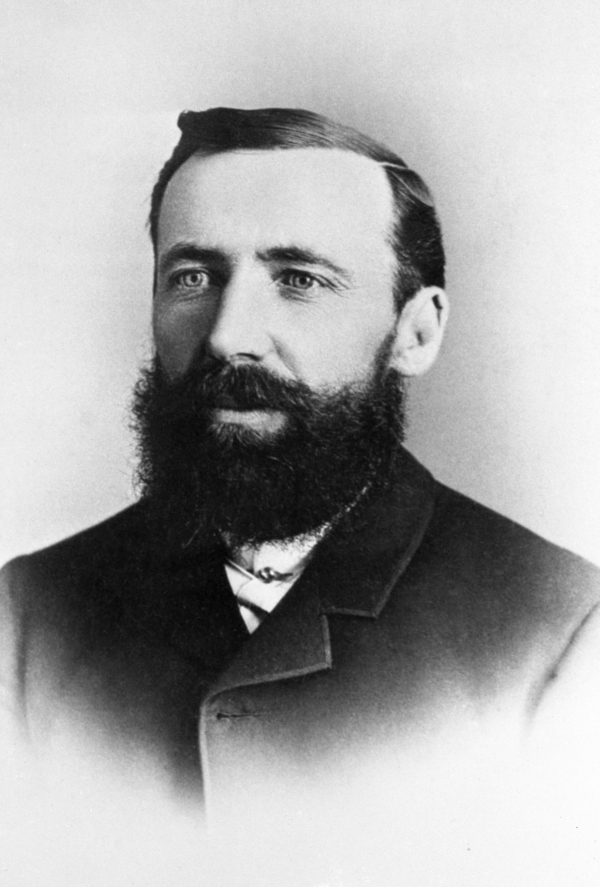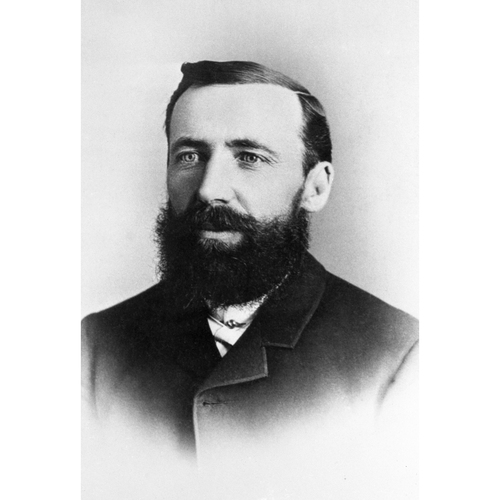
Source: Link
SEMMENS, JOHN (he may have been named Theodore John), Methodist missionary and school superintendent, Indian agent, inspector for the Department of Indian Affairs, and author; b. 9 Jan. 1850 in St Hilary, Cornwall, England, son of John Semmens and Sarah Hoar; m. first 27 Aug. 1878 Helen Kalista Behimer in Copetown, Ont., and they had seven children; m. secondly 4 Dec. 1907 Elizabeth Cross in Winnipeg; they had no children; d. there 1 Feb. 1921.
A Methodist missionary for 29 years before joining the Department of Indian Affairs in 1901, John Semmens was in the rare position of understanding the aims and policies of both the dominion government and the Methodist Missionary Society. Along with his mother and sister, he had left England in 1860 to join his father at Bruce Mines, Upper Canada. He enrolled in Victoria College, Cobourg, in 1868, but probably did not obtain a degree. In 1870 the Reverend William Morley Punshon* recruited him for a new parish in Walkerville (Windsor). Specially ordained in October 1872, Semmens left immediately for what is now northern Manitoba. The Wesleyan Methodist Conference sent him to Norway House to help the Reverend Egerton Ryerson Young*, who was apparently ill with typhoid fever. Having arrived after a difficult journey over Lake Winnipeg by dog train, Semmens plunged himself into mission life, visiting the Cree and travelling to their hunting camps. He worked closely with Young until his transfer to Headingley, a village west of Winnipeg, in 1873.
In early 1874 Semmens, who wished to work with native people in the north, was sent to open a mission station at Nelson House. He relied heavily on Cree men such as Sandy Harte, Edward Paupanekis*, and William Isbister, an Orkney Cree, to interpret, teach school, and recruit a congregation. Semmens wrote warmly of the Nelson House community and believed his tenure had “resulted in the complete eradication of paganism and a purified society.” In 1876 he replaced Young among the Saulteaux at Berens River. From this base he visited outposts at Poplar River, Little Grand Rapids, Fisher River, and Pikangikum (Ont.). He led services, taught in the Berens River Methodist day school, and supported himself by fishing. While he appreciated his well-dressed, orderly congregation of 25, Semmens lamented that the “material . . . was so crude,” asserting that the Saulteaux were a hard people, full of the “viciousness of their heathen ways.”
In June 1878 the conference transferred Semmens from Berens River. He spent the next six years in mission work at white settlements in Manitoba and Ontario. In June 1884 poverty forced him to request a transfer to Norway House. The conference, unlike parish congregations, paid a regular, and thus secure, salary. While in Norway House he worked with his translator, John C. Sinclair, to transcribe several literary works, such as John Bunyan’s The pilgrim’s progress, and 200 hymns into Cree.
In 1888 Semmens’s sons were of school age and he felt that they needed better educational opportunities. He asked to be released from Norway House, in part because he believed that “Indian life was not altogether wholesome. . . . There was nothing stimulating or uplifting in our surroundings.” In June 1888 he went to work in Carberry and later he served in Winnipeg. The Manitoba and North-West Conference elected him secretary in 1891 and president in 1892.
In 1894 the Methodist Board of Missions recommended Semmens to the Department of Indian Affairs for the principalship of the soon-to-open Brandon Industrial School. Accordingly, he secured staff and recruited 38 Cree and Ojibwa children from Brandon, Norway House, and neighbouring missions. He served as superintendent until 1900. He accepted the position of Indian agent for the Berens River agency in April 1901. In 1903 he was transferred to the Clandeboye agency and two years later he became inspector of Indian agencies and schools. In 1908 he was named scrip commissioner with authority to take adhesions to Treaty No.5.
Semmens gave several lectures, wrote magazine articles, and published several small volumes and pamphlets in Cree syllabics, including The hand-book to Scripture truths in 1893. In 1884 he had published an account of his work, The field and the work. Writing of natives for the Methodist Magazine, he lamented that “darkness covers the land and gross darkness the minds of the people. The hereditary deadening influences . . . have not yet been eradicated.” Yet he was willing to concede that “while we have no desire to paint the Red Man white . . . many excellent traits of character are . . . associated with Indians.” In his ethnocentric and romantic views Semmens was a man of his times, and certainly he was regarded by his contemporaries as an expert in his knowledge and understanding of native people. Nevertheless his harsh judgements of Cree and Ojibwa culture stand out strongly within the missionary literature of the period.
John Semmens’s personal papers, including a copy of his autobiographical Under the northern lights: notes on personal history ([Winnipeg?, 1915?]), can be found in UCC, Manitoba and Northwestern Ontario Conference Arch. (Winnipeg), PP34. Semmens published numerous magazine articles, including “The Indian missions of the Methodist Church,” Methodist Magazine (Toronto and Halifax), 41 (January–June 1895): 128–34; a number were incorporated into his The field and the work: sketches of missionary life in the far north (Toronto, 1884). In addition, he is the author of The hand-book to Scripture truths, or, The way of salvation: words of admonition, counsel, and comfort [syllabic transcription into Cree], trans. William Isbister, rev. J. [C.] McDougall (Toronto, 1893), and Trials and triumphs of early Methodism in the great north-west (2nd ed., Toronto, 1910).
AO, RG 80-5-0-77, no.12093. G. H. Cornish, Cyclopædia of Methodism in Canada . . . (2v., Toronto and Halifax, 1881–1903). J. H. Riddell, Methodism in the middle west (Toronto, 1946).
Cite This Article
Susan Gray, “SEMMENS, JOHN (Theodore John),” in Dictionary of Canadian Biography, vol. 15, University of Toronto/Université Laval, 2003–, accessed January 20, 2025, https://www.biographi.ca/en/bio/semmens_john_15E.html.
The citation above shows the format for footnotes and endnotes according to the Chicago manual of style (16th edition). Information to be used in other citation formats:
| Permalink: | https://www.biographi.ca/en/bio/semmens_john_15E.html |
| Author of Article: | Susan Gray |
| Title of Article: | SEMMENS, JOHN (Theodore John) |
| Publication Name: | Dictionary of Canadian Biography, vol. 15 |
| Publisher: | University of Toronto/Université Laval |
| Year of revision: | 2005 |
| Access Date: | January 20, 2025 |



